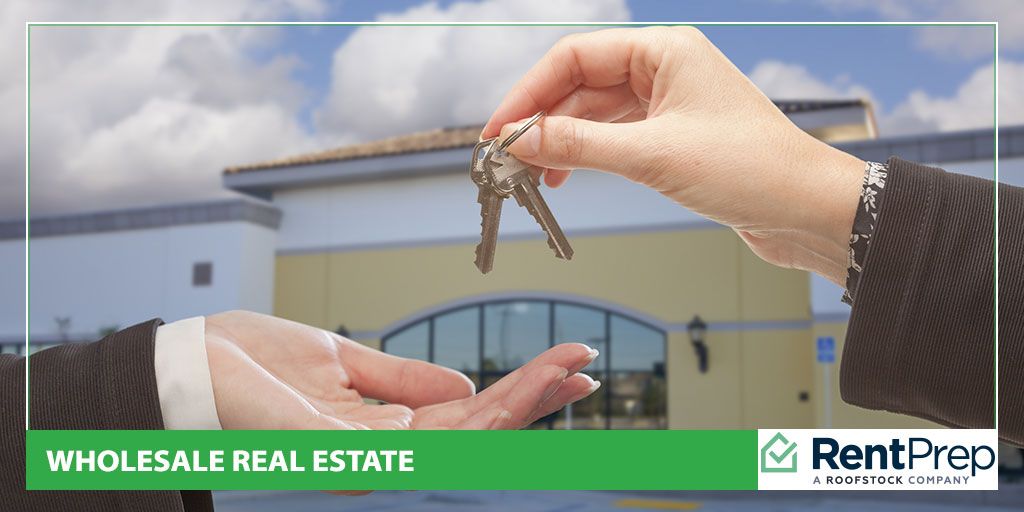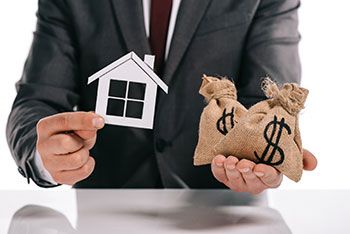
Wholesaling is not a new practice, but is growing in popularity in the current investing world. Wholesale real estate involves a middleman finding a seller rather than the buyer or the buyer’s agent handling this marketing and research process.
But what is it about wholesaling that’s valuable to real estate investors and even landlords working in the rental market? Will this type of investment business negatively affect your own purchasing potential if wholesalers are working in your area?
Landlords have these questions and more about how this unique investment process works. Let’s get into the details of property wholesale and how it works.
Table Of Contents On Wholesale Real Estate
Wholesale housing investment is different from standard investing. Whether you’re planning on trying out this type of investment or you just want to see how it will affect the market, everything you need to know is in this guide:
- What Is Wholesale Real Estate Investing?
- How To Wholesale Real Estate
- Wholesaling Real Estate Benefits
- Downsides Of Wholesaling Real Estate
- FAQs On Wholesaling Homes
- Property Wholesale: Is It In Your Future?
What Is Wholesale Real Estate Investing?

Real estate wholesaling is a type of short-term investing in which a “wholesaler” middleman sets up a contract with a property seller. After identifying potential buyers, the wholesaler will then assign this contract to the buyer.
The wholesaler never actually purchases the property. Instead, this process relies on the temporary contract they have with the seller, which allows them to market the property and sell it in their stead.
This process allows wholesalers to earn a set wholesaling fee, usually a percentage of the overall property cost, without putting down any significant capital. Compared to other types of real estate investing, this type has a much lower entry cost. It is thus very popular with new investors and those looking for gains to support their other investment projects.
Properties sold through wholesalers are often distressed properties or those that need to be offloaded by an owner who cannot send them to a traditional sale. Working with a wholesaler allows them to sell the property faster, but they will also see lower profits.
Buyers in wholesaler situations are usually investors or real estate rehabbers. These can be landlords, flippers, or other individuals who work within the industry. These individuals don’t want to negotiate with sellers or search for discounted properties. Instead, they want to identify potential properties for their work quickly, and working with wholesalers helps them do just that.
Wholesale Real Estate Example
It’s easier to understand how this type of investment works if we look at an example of a wholesale real estate transaction.
A homeowner, John, owns an outdated property. He had plans for it at one time but instead now wants to sell. However, John doesn’t think it will sell quickly due to its condition. So he decides to work with a wholesaler.
The wholesaler sets a contract with John to put the house under contract for $80,000. The wholesaler then finds an investor willing to purchase the property for $95,000. When all is said and done, John gets his $80,000 for the property, and the wholesaler profits $15,000.
The wholesaler never purchases the property. Finding a buyer before the contract closes means they are never in possession of the property and only gain their profits.
How To Wholesale Real Estate
Wholesaling real estate can be a source of steady income, but some essential steps must be followed for this investment strategy to be profitable.
The three main steps look like this:
- Identify properties selling for under-market value, that are off market but ready to sell, or otherwise need to be sold at a discounted price.
- Set up an agreement with the seller.
- Find a buyer and assign the purchase contract to said buyer.
After locating a buyer, wholesalers use one of two methods to wrap up the deal. Take a look at each closure method’s details to understand how wholesale deals are usually wrapped up.
#1: Contract Assignments
This is the easiest and most common way of doing wholesale real estate.
With this method, a wholesaler assigns the contract they have to the end buyer. The wholesaler initially made a purchase and sale agreement with the seller. This contract can then be sold or “assigned” to another party so that, instead of the wholesaler, the end buyer can take over the role of the buyer in the purchase contract.
When setting up this method, wholesalers must ensure that the purchase contract does not contain any language that prevents them from passing on the role of the buyer to another individual.
The wholesaler isn’t selling the property, nor will they ever own it. Instead, the end buyer will take over that role and send the necessary deposit for the sale to be completed. Then, the excess payment will be sent to the wholesaler as a finder’s fee.
#2: Double Escrow
Another wholesaling process that occurs in some situations is a double closing, also known as a double escrow. This situation arises whenever local laws require a simultaneous close rather than standard contract assignment or when the seller disagrees with the assignment.
In a double closing, the wholesaler will temporarily take the property title. The property will close in the sale from the seller to the wholesaler and then again from the wholesaler to the end buyer. Both closings happen on the same day or within a short period to ensure that the transition of properties occurs.
Wholesaling Real Estate Benefits

Less Time, Good Money
Real estate wholesaling makes it possible to earn profits in a shorter time frame than with other investment strategies. Profit margins won’t be as large as in other investment areas, but they are faster transactions that can be done more frequently, so the long-term benefit is there.
Profits Beyond Finances
Investors working in real estate wholesaling will learn a lot in the process. You can utilize this type of strategy to learn more about the real estate market in your investment area and expand your business in the future.
Work Without Capital
Wholesaling real estate is possible even if you have limited capital or credit to work with. Since contract assignments do not require you to front any money for a property, you can get involved with this type of investment without being able to put a lot down.
Downsides Of Wholesaling Real Estate
No Consistent Paychecks
Income is unpredictable when working within this investment strategy. Unlike working as a landlord or property manager, it is very hard to predict your paydays when working in wholesaling. This must be something that you plan for if you follow this strategy.
Finding Buyers Is Difficult
Without buyers, wholesaling cannot be successful. Your contract with the seller involves some level of personal risk. If you cannot find a buyer, you may lose what you put in escrow or need to pay the seller. To avoid this, many wholesalers find potential buyers before they even work with the potential seller.
Buyers Lists Are A Must
A great buyers list is necessary to survive in wholesaling, but building your first list will be challenging. Once you have the list, you will also need to regularly update it to ensure that those on the list are still actively purchasing properties. This will require consistent outreach and marketing.
The Latest In Real Estate And Rental Market Updates
There’s a lot to keep up with in the rental and investment market—wholesaling homes is just one of those fields. When working hard as a landlord and property manager, keeping tabs on these changes isn’t always easy.
Sign up for RentPrep’s newsletter today. This newsletter is packed full of updates for landlords, from landlords. From podcasts to blog posts, you’ll find a lot of value in this newsletter every time it hits your inbox.
FAQs On Wholesaling Homes
What is real estate wholesaling?
Wholesaling is a business strategy that focuses on short-term contracts for big profits. In real estate wholesaling, the investor works as a middleman to connect a property owner who wants to sell with potential buyers. Usually, the properties involved in wholesaling are distressed or in need of major repairs in order to become usable as investment properties or homes.
Wholesalers make a contract with the homeowner. Once they find a potential buyer, the wholesaler assigns the contract to them, and the transaction continues from there between the buyer and the seller. There are a few ways that money and contracts change hands, but the wholesaler gets a portion of the profits during the sale.
Is wholesaling real estate legal?
There’s a lot of confusion around this point, and many traditional investors do not like how wholesaling works. Similarly, real estate agents often feel it disrupts their business practices.
However, wholesaling is largely regarded as legal. There are very few places that have restrictions on this type of business activity. Since the wholesaler never sells the actual property and instead is selling a contract, there aren’t rules preventing this practice. There is no need for a real estate license in this scenario because they are not carrying out a sale.
Is wholesaling real estate a good investment strategy?
Every investment strategy has its pros and cons, and wholesaling real estate is no different. This short-term business strategy is often touted as an excellent choice for those who are just getting started in the market and don’t have a lot of free capital to throw around. Wholesaling allows you to work on understanding your market more deeply and negotiating deals for undervalued properties.
These tools are great for landlords and investment owners who want to continue in the business, but they aren’t the easiest to hone. It requires an all-in mentality and dedication, so don’t consider wholesaling to be a get-rich-quick scheme.
How do you find cash buyers for wholesale real estate?
Once real estate wholesalers have a contract on a property, they must make up a potential buyers list and start negotiating deals. Finding buyers, especially cash buyers, is a challenging feat in many markets.
The best way to build up this list is through intense networking and marketing:
- Subscribe to lists in your area:
If there are wholesalers in your area, subscribe to their marketing. Keep track of properties they list. Once sold, look up who bought the property. These buyers may be investors targeting the types of properties you are selling, and you can add them to your own buyers list. - Research local investors and landlords:
Pay attention to who is buying and renting in your area. Get in contact with them, let them know about your business, and find out if they have any interest in being the first to know about your upcoming sales. You can even visit auctions to see who is buying in the area. - Set up a website and lead captures:
A simple website and landing page is a great place to capture potential buyers’ and sellers’ names and contact information. Use this hub to collect the info needed to run a thriving wholesale business.
Is a real estate license needed for wholesaling?
A real estate license is not needed for real estate wholesaling. In this practice, you are not acting as a real estate agent or selling a property. You are signing a contract with a seller and then assigning that contract to an interested buyer.
Property Wholesale: Is It In Your Future?
Now that you know more about property wholesaling and how it works, you might have some creative ideas on how you can expand your investment choices and purchase sources.
There are a lot of ways that real estate wholesaling could play into your future business:
- Connecting with wholesalers may provide future purchase opportunities.
- Adding wholesaling to your repertoire may give you extra money for renos and rentals.
- Understanding the effect wholesaling has on the market may set you up to adjust your property sourcing process.
Regardless of your feelings on real estate wholesaling, there is no doubt that this type of investment is happening. Knowing more about it ensures you are better informed of the investment market.

